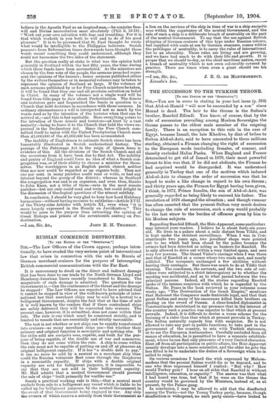RUSSIAN COMMERCE DESTROYERS.
[To TILE EDITOR OP TES "SPECTATOR."]
Sin,'—The Law Officers of the Crown appear, perhaps inten- tionally, to have evaded the very serious point of international law that arises in connection with the sale to Russia of German merchant cruisers for the purpose of intercepting British commercial communications with the Far East.
It is unnecessary to dwell on the direct and indirect damage that has been done to our trade by the North German Lloyd and Hamburg-American liners recently transferred to Russia. The magnitude of such damage is admitted. The question for our Government is,—Can the continuance of the threat and the damage be stopped? The Law Officers are reported to have advised that it cannot be stopped in view of the well-known principle of inter- national law that merchant ships may be sold by a neutral to a belligerent Government, despite the fact that at the time of sale it is well known by the vendors that if these contraband ships are safely delivered they will be converted into cruisers. The present case, however, it is submitted, does not come within that rule. The rule is one which must be construed strictly, and is limited to vessels that are essentially and strictly mercantile.
The test is not whether or not ships can be rapidly transformed into cruisers—as many merchant ships can—but whether their primary and original function is mercantile and nothing else. If the ships sold are ancipitis usus, capable, and built for the pur- pose of being capable, of the double use of war and commerce, then they do not come within the rule. A ship to come within the rule must not be capable of putting on and off at pleasure an original belligerent capacity. If it has "a double debt to pay," it can no more be sold by a neutral as a merchant ship than could the Russian volunteer fleet come through the Bosphorus in a mercantile capacity. If ships with a double original capacity are sold for belligerent purposes, it is impossible to say that they are not sold in their belligerent capacity. Mr. Hall admits that a neutral Government should prevent the sale of ships "built primarily for warlike use."
Surely a practical working rule is this,—that a neutral must exclude from sale to a belligerent any vessel which is liable to be called up for belligerent purposes by the neutral Government in the event of that Government being engaged in war. Any ship the owners of which receive a subsidy from their Government as a lien on. the services of the ship in time of war is a ship aseipitis 'USW within the cognisance of the neutral Government, and the sale of such a ship is a deliberate breach of neutrality on the part of the neutral Government. To say that the use against British shipping of German cruisers of this type under Russian colours, but supplied with coals at sea by German steamers, comes within the privileges of neutrality, is to carry the rules of international law to an absurdity. Those rules are living and are growing, and we have had much to do with their life and growth. It is proper that we should to-day, as the chief maritime nation, resent a breach of neutrality which is not even colourably covered by practice. There are times when even a giant should use his strength.
Lincoln's Inn.


































 Previous page
Previous page